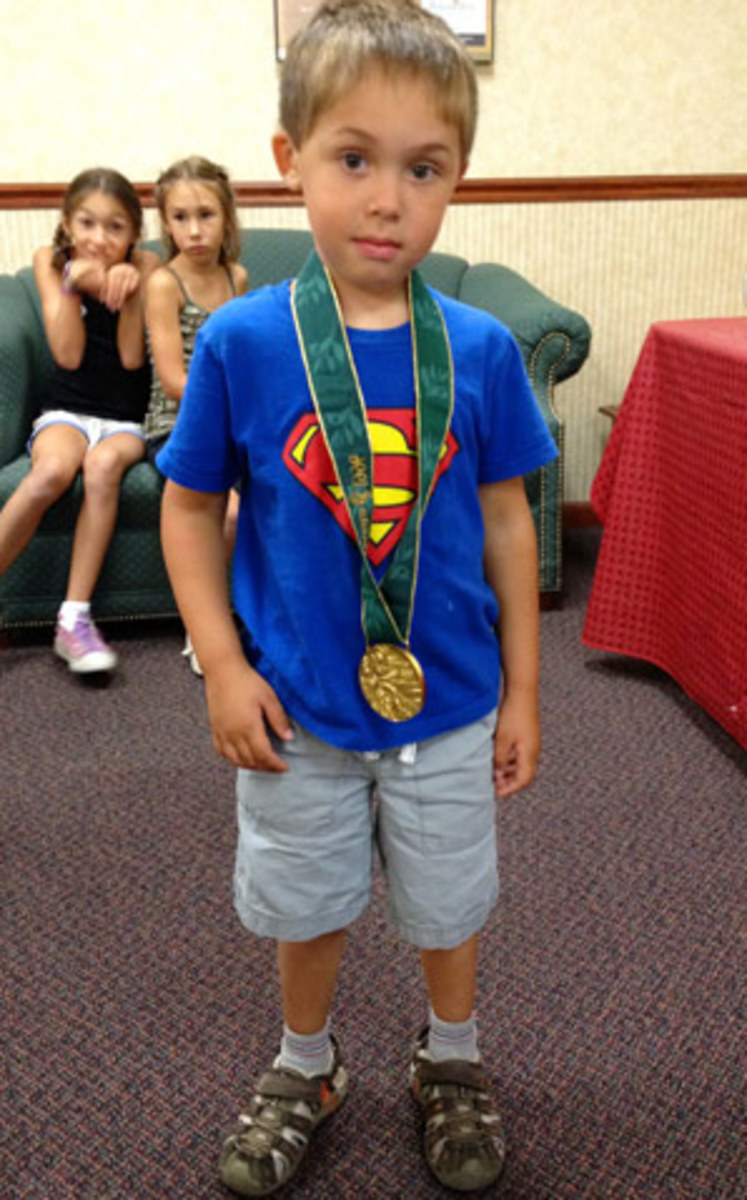Finding a long forgotten gold medal and getting chills all over again
"These are the best athletes in the world," the announcer was saying, over an Olympic event that was blocked by my 7-year-old's silhouette -- her head, ears and pigtails backlit by the TV screen. A light bulb buzzed to life above that head and she said, without turning around, "Mom, you were in the Olympics, right?"
"A long time ago," my wife said from her armchair.
"Still," our daughter said, checking the math of her own logic. "That means you ... were one of the best people in the world ... at basketball." ("And yet you can't even microwave oatmeal," she seemed to imply.)
Like everyone else, our four kids had been watching the Olympics with growing fascination. After much nagging, I'd spent an afternoon driving around town trying (without success) to buy a volleyball net. We spent an evening in the driveway trying (again without success) to corner-kick a beach ball into the basketball hoop. (It seemed like an Olympian pursuit: Difficult, random, slightly ridiculous.) Our 5-year-old got so into synchronized diving that she was left bereft by the arrival of its perverse cousin, non-synchronized diving. "Why is there only one person up there?" she asked with mounting horror.
But the kids' Olympic spirit was most evident when they were racing down the upstairs hallway, or racing scooters down the driveway, or fighting to be first in the car -- their usual taunts of, "I won, you lost" replaced by Olympian taunts of, "I won gold, you won silver."
"Where's your gold medal?" our 5-year-old daughter asked her mother after one of these races.
"In a bank," she replied. And then, after a pause: "At least I think it is."
The kids had never seen her gold medal, I'd never seen her gold medal, and my wife, Rebecca Lobo, hadn't seen her own gold medal in 16 years, since a few days after she'd won it in Atlanta. Now, she wondered if it really was still in that safe deposit box, for which she hadn't seen a bill in ages. What if the bank lost her forwarding address, and auctioned off the box, perhaps to one of the guys on Storage Wars? (I pictured Barry Weiss holding it in those skeleton-gloved hands of his.)
"Can we see your gold medal?" our 7-year-old asked.
Eleven seconds later we were in the van.
In the cold silence of the bank lobby, a manager appeared with countless keys. She unlocked one exterior door, and then the kind of shiny steel door seen in heist movies. She stepped inside that metal box and withdrew a smaller metal box, which my wife unlocked to reveal a third box: This one wood, like a small humidor, with the Atlanta 1996 logo on the top.
For the first time since she was 22, she opened it, slowly, as if revealing an engagement ring. She raised the medal to her nose and said, "I wonder if it still smells like beer."
As well it might, for the medal hadn't seen daylight since she'd returned, slightly hung over, from the Atlanta airport, where security officials had demanded she remove it from her duffel bag so they could "inspect" it. Gold medals get this all the time in public: They're rubbed, grabbed, groped and bitten, the way cashiers bit nickels in 1895. It's like being on the subway 24 hours a day, which is why it has been in solitary confinement for most of its life.
I picked up the medal by its green-and-gold ribbon and hung it around my 3-year-old's neck. He scratched at the edge, where WOMEN'S BASKETBALL was engraved in tiny letters, as if it were gold foil wrapping concealing a chocolate coin. The 5-year-old put it on, then the 7-year-old, and finally the 1-year-old, who bit into it, the raised Olympic logo now five teething rings.
"May I?" It was the bank manager, who ran her fingers across the medal and said, "I've always wanted to see one." The bank manager's boss emerged from an office and hefted the medal in her palm. A customer in work boots paused to take a gander, and then the bank teller, from her window across the lobby, whisper-shouted, "Is it OK if I ...? I've been watching the Olympics and I ..."
And suddenly there was a group of us, standing around a bank lobby, looking at this glorious beer coaster, 92.5 percent silver, plated in 24-karat gold, getting inexplicably misty-eyed at 1 p.m. on a Monday afternoon. Finally, the manager spoke. "I saw one of these on Pawn Stars," she said, sending a shudder down my wife's spine.
In fact, the Gold & Silver Pawn Shop in Las Vegas has two Olympic medals, both bronze, one from Atlanta (priced at $20,000) and one from Barcelona (priced at $10,000). It would be foolish to leave an Olympic gold medal around the house, especially one full of little kids.
But those kids were treating it like a puppy at the pound. "Can we take it home?" the 7-year-old asked, stroking its chin and thinking of names for it. And so we did, for two days, where it sat on the kitchen counter, receiving a small line of neighbors, children and UPS guys. Today, we're returning it to captivity before it's forever lost in the sandbox.
The gold medal, we reasoned, has spent most of its life in prison. It's a hardened criminal who gets out of the joint for a few days, then commits a petty crime to get sent back in, where it's most comfortable. We know it's happy there, and we've promised to visit soon. It knows we won't -- and it's probably right -- but it makes the goodbye a little easier.






